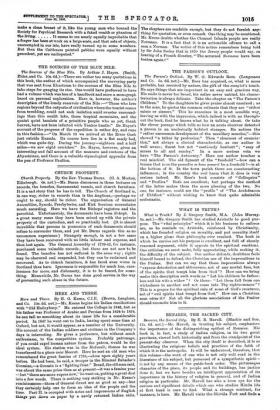WHAT IS TRUTH P
What is Truth ? By J. Gregory Smith, M.A. (John Murray. 55. net.)—Mr. Gregory Smith has studied Aristotle to good pur- pose. The " vital principles" which it is his business to enforce are, as he reminds us, Aristotle, reinforced by Christianity, which has founded religion on morality, and put morality itself on a higher plane than philosophy ever reached. The book in which he carries out his purpose is excellent, and full of closely reasoned argument, while it appeals to the spiritual emotions. One criticism we must make, fully appreciating, while making it, the difficulty of the subject. Our author defends, doubtless feels himself bound to defend, the Christian use of the imprecations in the Psalms. But can we say that these imprecations always "express detestation and abhorrence, not of any mortal foes, but of the spirits that tempt him from God" ? How can we bring under this description such words as "Let his children be father- less and his wife a widow " ? Or these : " Let them fall from one wickedness to another and not come into Thy righteoueness " ? This is a prayer for the spiritual ruin of some of God's creatures, not of " evil spirits that tempt from God." How can a Christian man utter it? Not all the glorious associations of the Psalter should reconcile him to it.


























































 Previous page
Previous page